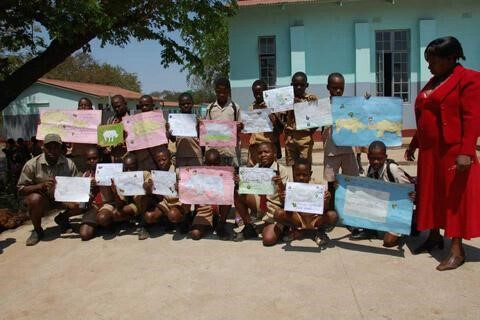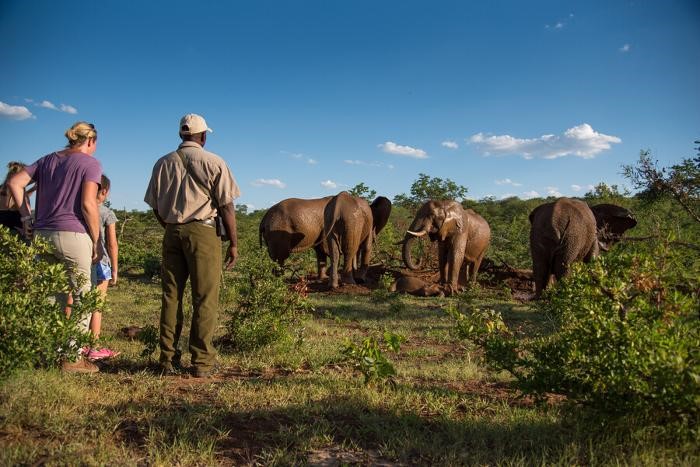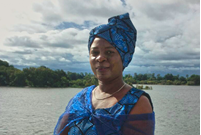Meet Wild Horizons the Conservation Champion in Zimbabwe
VICTORIA FALLS – Wild Horizons is an eco-tourism operator devoted to conserving and celebrating the pristine natural wilderness in which they operate. From the Zambezi River to the National Park, they are wholeheartedly invested in Africa’s pristine and unique natural beauty.
They work tirelessly to preserve and protect the environment in every dimension of the business, sharing ecotourism’s benefits with the communities that they work alongside. Behind every Wild Horizons venture is a purpose aimed at creating an enriching travel experience for our guests while conserving Africa’s wilderness and wildlife for the local communities and future generations.
Its social responsibility philosophy symbolises the moral compass that they use as a guiding framework for all decision-making within the organisation.
Community Outreach and training program
 The health of Africa’s ecosystems relies on the support of surrounding local communities, and to this end, Wild Horizons has established a ‘Community Outreach and Training’ program.
The health of Africa’s ecosystems relies on the support of surrounding local communities, and to this end, Wild Horizons has established a ‘Community Outreach and Training’ program.
Through this project, they aim to inspire the external community to learn about and appreciate the importance of sustainability and conservation. To achieve this, they work closely with local communities to mitigate human-wildlife conflict, provide opportunities for conservation education and support a range of projects to empower self-sustainability and these includes vegetable and subsistence crop growing.
Wild Horizons believe that education is the pillar that will uphold and support sustainable conservation.
This grass-roots conservation education program challenges misconceptions of wildlife in rural areas in the Victoria Falls region. Our mission is to demonstrate respect for and understanding of wildlife through this opportunity to connect with animals in the most positive and natural way possible. The education program casts a pebble into the waters of change, and they are confident that the ripple effect will be felt by many generations to come.
 Wildlife Ambassadors
Wildlife Ambassadors
The elephant herds that live in the sanctuary act as wildlife ambassadors for their species to champion a message of coexistence with their rural and urban neighbours.
Wildlife ambassadors are animals that can-not be successfully rehabilitated, and by sharing their rescue stories, these animals act as ambassadors for their species to increase awareness of their plight in the wild.
Research shows that wildlife ambassadors provide compelling experiences needed for people to gain personal connections and relationships with nature. The elephants epitomise this fact, and the awe and respect that the children garner through this experience transforms their ideologies and ignites a sense of pride for their natural environment.
Wildlife Veterinary Clinic
The Trust Veterinary Laboratory and Clinic is a field station from which researchers, veterinarians, and graduate students can study zoonotic diseases that are transmitted across species and boundaries. Transmission of these diseases can cause epidemic crashes of keystone wildlife species, and to prevent the ensuing socio-economic and public health catastrophes, they take samples from domestic and wild animals to understand and prohibit disease prevalence.
Wildlife Rehabilitation Centre
The ‘Wildlife Rehabilitation Centre’ provides veterinary care to wildlife that has been injured, orphaned or abandoned due to snaring, human conflict, poisoning or vehicle-wildlife collisions. It is the goal of the Trust to release every injured animal back into the wild. One of the highlights of 2018 was the day that they successfully released Aardy the aardwolf back into his natural habitat. Aardy was temporarily paralysed after a vehicle hit him, and while the road to recovery was long, the collaborative effort between the private sector and governmental wildlife agencies ensured his successful rehabilitation.
Wildlife Research Projects
The seeds for long-term environmental protection are planted in the Trust’s wildlife research projects. By investigating what may cause a species to flourish or flounder, they are in a stronger position to evaluate the factors and find sustainable solutions. Their ultimate research objective is to promote a sustainable harmonic existence between humans and the wilderness.
Support for National Parks
Game Scouts
We believe that sustainability relies on the combined effort of Victoria Falls Anti Poaching Unit. The Victoria Falls Anti Poaching Unit has been instrumental in reducing instances of poaching, and we applaud their momentous success. Wild Horizons sponsors three officers employed by VFAPU to assist with anti-poaching activities in and around Victoria Falls.
Rainforest Raincoat Project
This project provides jobs and income at a grassroots level. We source and donate raincoats to an association of vendors who hire them out to guests visiting the Victoria Falls rainforest. This provides an ongoing income to more than 30 vendors and their families.
Clean Up Team
Once a month, Wild Horizons, together with other tourism entities in the area, embark on a litter sweep throughout the town, helping to keep Victoria Falls clean.
School Fee Payment
Wild Horizons is a community-oriented organisation, and our dedication to the next generation’s future extends beyond conservation into the realm of school education. To this end, we pay the school fees of 67 children at eight rural schools in the region.
Donations to the Old Age Home
In collaboration with the Hospitality Association of Zimbabwe, Wild Horizons contributes to the salaries of employees at the local Old Age Home. Once a year, we donate gas for their stove and host a meal for the people residing there.
Chinotimba Vegetable Garden
Nestled within the Chinotimba township area, a community of people living with HIV/AIDS has cultivated a vegetable garden, and Wild Horizons supplies them with gardening implements, seeds and fertiliser to support this empowering and uplifting initiative.
CHOGM Garden
In collaboration with the Victoria Falls Municipality, Wild Horizons monitors the upkeep of the CHOGM garden at the entrance to the town. We have installed the irrigation system and will continue to care for and maintain the garden.
Sport Donations
Wild Horizons donated two soccer balls and soccer kit for 18 players in the Sizinda community soccer team, Cremora FC. Our support and involvement with their team has opened the door to future collaboration, be this in the realm of sport or conservation. We believe that this company is not a sole entity, but a member of the greater Victoria Falls community.
Initiatives the elephant camp and old drift Lodge
The Elephant Camp has recently been refurbished and all decking has been replaced with environmentally friendly material consisting of 60% bamboo and 40% recycled plastic. Bamboo is the most sustainable and abundant raw material to use as it is the fastest growing grass in the world. 1600 square meters of decking was replaced, and by using the composite decking, 400 000 plastic bottles were recycled.
We used 3000 square meters of decking when building Old Drift Lodge, which recycled 750 000 plastic bottles.
Our purpose has always been to conserve and celebrate Africa’s natural wilderness and wildlife by creating opportunities for people to journey into some of the world’s unique and exquisite natural areas.
Indigenous Tree Planting Program
To rehabilitate areas that were once denuded of trees by uncontrolled harvesting of firewood and wood for carving, The Elephant Camp has created an indigenous tree nursery. Only trees indigenous to the area are planted from seed, and once well enough established, are transplanted into areas in need of rehabilitation. Sticks are doused in chilli oil and dotted around the saplings to prevent elephants, baboons and other wildlife from damaging them. According to our Environmental Officer the trees are doing much better since we started this and the vegetation in these areas is starting to look more natural and luscious. In the first month of 2019, 155 trees were planted around the Wallow, the Sanctuary, the Wildlife Trust and the Masuwe River wetlands. The species of trees include Faidherbia Albida, Kigelia Africana, Philenotera Violacea, Azana Garckeana, Acacia Erioloba, Acacia Tortilis, Adansonia Digitata, Colophospermum Mopane, and Alzelia Quanzenis.
With Wild Horizons
Plastic pollution is a global epidemic, causing immense damage to the ecosystem and posing a danger to animals through consumption. The eradication of single-use plastic products is essential for ecotourism, and through various initiatives, Wild Horizons hopes to accelerate positive change in the region by providing a leading example of sustainable tourism. The elimination of single-use plastic products began with the ban on plastic straws in all of our camps, on our river cruises, and at The Wild Horizons Lookout Café. To demonstrate the sincerity of our sustainability commitment,
We believe that our employees are our most valuable assets and we strive to ensure that they feel fulfilled, rewarded and valued as ambassadors of Wild Horizons. Our operations have created employment opportunities within the region, and 80.04% of our staff is from the immediate vicinity.



